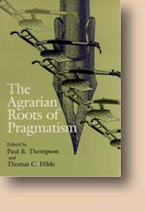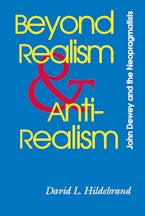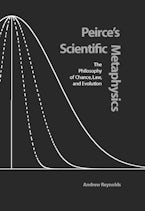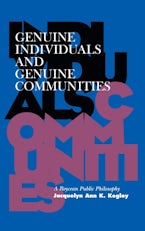- Home
- The Agrarian Roots of Pragmatism

The Agrarian Roots of Pragmatism
Edited by Paul B. Thompson and Thomas C. Hilde
344 Pages, 6in x 9in
Today, most historians, philosophers, political theorists, and scholars of rural America take a dim view of the agrarian ideal that farmers and farming occupy a special moral and political status in society. Agrarian rhetoric is generally seen as special pleading on the part of farmers seeking protection from labor reform and environmental regulation while continuing to receive direct payments and subsidies from the public till.
Agrarianism should not be viewed as a set of immutable claims about farming and political order, but as a tradition of moral and political philosophy that has evolved and deepened over the centuries. Agrarian naturalism--the belief that culture and conduct are conditioned by nature because they are of a piece with nature--becomes pragmatic naturalism, giving way to a new set of puzzles about how we are to understand the rural landscape and our responsibilities for its use. The agrarian idea that personality and sociability are integrated with the material transformation of the landscape can serve as the basis for a new, pragmatically grounded ethic of natural resources and rural development.
The essays in this volume critically analyze and revitalize agrarian philosophy by tracing its evolution in the classical American philosophy of key figures such as Franklin, Jefferson, Emerson, Thoreau, Dewey, and Royce. Three chapters address the belief that farming peoples develop moral virtue and a taste for democracy as it evolved in the American context, and four examine how a reconstitution of agrarian themes might invigorate our nation's thinking on environment, food, and rural development policy.
The Agrarian Roots of Pragmatism will be of broad interest to scholars of American philosophy, rural history, history of ideas, geography, and agricultural or natural resource policy.
Paul B. Thompson is professor of philosophy at Purdue University and is the author of Agricultural Ethics: Research, Teaching, and Public Policy (1998).
Thomas C. Hilde is a doctoral candidate in philosophy at Pennsylvania State University.
The Agrarian Roots of Pragmatism represents a unique contribution to the history of American thought, one that has been entirely too neglected. This collection promises to be an especially important resource for scholars of rural life and for scholars and activists involved in the reform of agriculture.
--Richard Haynes, The University of Florida











